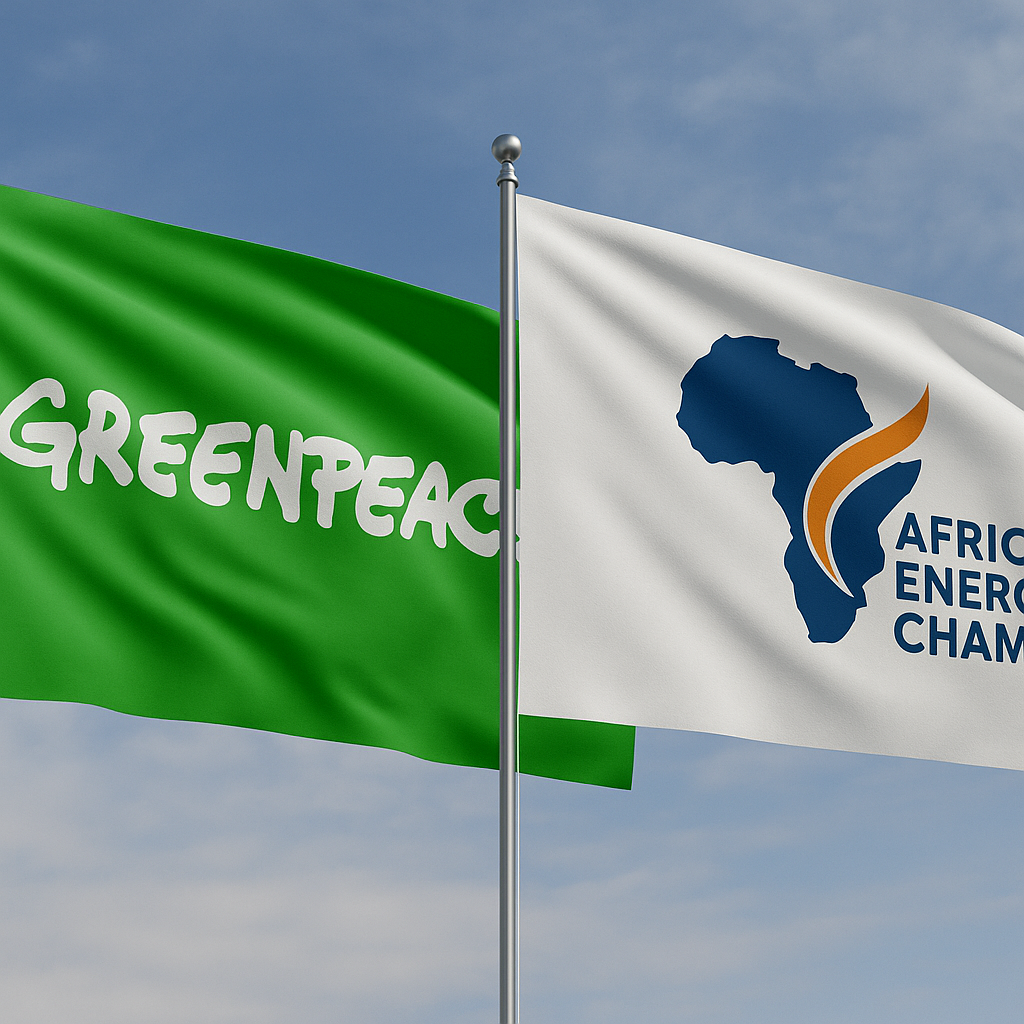Greenpeace vs African Energy: AEC Defends Development Against ‘SLAPP’ Claims
SLAPP suits are civil actions filed—often by corporations—against activists, journalists or NGOs in an effort to burden them with litigation costs and discourage further criticism.

- Country:
- South Africa
The long-running feud between the African Energy Chamber (AEC) and environmental campaign group Greenpeace has reignited after Greenpeace accused African oil-and-gas advocates of using Strategic Lawsuits Against Public Participation (SLAPPs) to muzzle dissent. The spark was a recent U.S. jury decision that ordered Greenpeace to pay US $660 million for “malicious interference” with the Dakota Access Pipeline (DAPL)—a verdict Greenpeace says sets a chilling precedent. The AEC, however, argues the judgement illustrates “justice served” against organisations that, in its view, deliberately thwart projects that could lift millions of Africans out of energy poverty.
What Is a SLAPP Suit?
SLAPP suits are civil actions filed—often by corporations—against activists, journalists or NGOs in an effort to burden them with litigation costs and discourage further criticism. Greenpeace maintains that the DAPL judgement and other cases are proof of a growing global trend in which powerful interests exploit the courts to silence environmental defenders. The AEC counters that the North Dakota ruling is narrowly focused on illegal sabotage and defamation, not protected speech, and therefore cannot be dismissed as a mere intimidation tactic.
Africa’s Energy Reality
-
Reserves: Africa holds an estimated 125 billion barrels of crude oil and 620 trillion cubic feet of natural gas—figures comparable to the proven reserves of the U.S. and Russia combined.
-
Energy Poverty: 600 million Africans lack grid electricity and 900 million rely on biomass and charcoal for cooking.
-
Economic Stakes: Large-scale oil, gas and LNG projects could add US $30–40 billion annually to African GDP, according to the African Development Bank, while creating hundreds of thousands of skilled jobs.
The AEC argues that halting exploration and pushing for an immediate phase-out of fossil fuels in Africa ignores the urgent development needs of the continent. It notes that OECD nations consumed fossil fuels for over a century to build their economies, yet now insist that Africa leapfrog directly to renewables without the capital, grids or storage to do so at scale.
Case Study: East African Crude Oil Pipeline (EACOP)
TotalEnergies’ 1 442-km EACOP, linking Uganda’s Lake Albert oil fields to Tanzania’s Port of Tanga, is frequently targeted by Greenpeace, which claims the project threatens biodiversity and locks East Africa into carbon-intensive infrastructure. In response, EACOP’s developers cite:
-
70 000 stakeholders consulted during Environmental and Social Impact Assessments (ESIAs).
-
Alignment with International Finance Corporation Performance Standards.
-
Ongoing third-party audits and grievance-redress mechanisms.
The AEC highlights EACOP’s potential to generate US $2 billion in annual revenues for Uganda and Tanzania, spur local manufacturing, and catalyse new power-generation capacity.
Greenpeace’s African Campaigns
Greenpeace’s high-profile actions include court bids to halt Shell’s offshore seismic surveys in South Africa’s Wild Coast, appeals against Africa Oil Corp’s exploration permits, and lobbying financiers to quit Mozambique’s Rovuma LNG megaprojects. The AEC contends that such campaigns hamper governments’ ability to quantify resources, delay investment decisions, and deter multilateral lenders—ultimately prolonging black-outs, deforestation and unemployment.
Accusations of Selective Activism
AEC executives accuse Greenpeace of focusing disproportionately on African and Latin-American producers while “giving a free pass” to major Middle-East exporters and some OECD countries. Greenpeace rejects that claim, pointing to its decades-long work against Arctic drilling and Canadian tar-sands expansion. Nonetheless, critics say Greenpeace’s fund-raising rhetoric—“To Hell with Shell” in South Africa, for example—contributes to a perception of adversarial rather than cooperative engagement.
Toward Sustainable Compromise
Many African governments insist they can pursue hydrocarbons responsibly while scaling renewables. Senegal’s MSGBC Basin, Nigeria’s Decade of Gas initiative, and Namibia’s burgeoning green-hydrogen roadmap are often cited as “both-and” strategies that blend LNG export revenues with rapid investment in solar and wind. The AEC urges environmental NGOs to join multi-stakeholder platforms, help set methane-reduction targets, and co-design just-transition programmes rather than seek blanket bans.
The Bigger Question
At the heart of the debate is whether Africa’s right to industrialise using its natural resources clashes irreconcilably with the urgency of the global climate agenda. The AEC frames the issue as an ethical imperative: denying 600 million Africans reliable electricity to meet a net-zero timeline set elsewhere is, in its view, “energy imperialism.” Greenpeace asserts that locking Africa into long-lived fossil-fuel assets could saddle future generations with stranded costs and climate damages.
The US $660 million DAPL ruling has given opponents and proponents of large hydrocarbon projects fresh ammunition in a legal, moral and economic battle that spans continents. Whether labelled a SLAPP or a legitimate quest for accountability, such litigation underscores the high stakes of energy development. As Africa edges closer to commercialising giant reserves—from Namibia’s Orange Basin to Mozambique’s Coral South LNG—the continent’s leaders face a pivotal choice: yield to external pressure to “keep it in the ground,” or leverage hydrocarbons—alongside renewables—to drive the inclusive growth promised in Agenda 2063.










